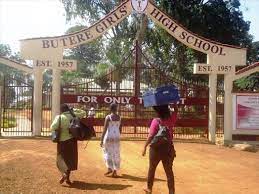A full-blown boycott rocked the National Drama Festivals in Nakuru on Thursday after performing schools refused to take the stage in solidarity with Butere Girls High School.
The morning had started with anticipation, but it quickly shifted into unrest when Butere Girls declined to present their controversial play 'Echoes of War.'
Instead, the students stood in silence, sang the national anthem, and walked off the stage in tears—setting off a chain of reactions that brought the entire festival to a halt.
Soon after, other schools followed suit, declining to perform and joining Butere Girls in protest outside the Melvin Jones Hall.
Attempts by organizers to restore order failed, as students demanded fair treatment, support, and the presence of those who had guided them throughout the drama season.
"We want to perform, and we want our director. It is our right to perform," the Butere students declared as they stood outside the hall.
Students from other institutions voiced similar frustrations.
The wave of protest quickly spread as performers cited confusion, missing equipment, and the absence of their directors as reasons for their withdrawal.
Others chose to remain on their buses, refusing to engage with a program they now viewed as unfair and mismanaged.
A once-celebratory festival had turned into a tense standoff between students, organizers, and police.
Tension escalated when police intervened to disperse the crowd.
Tear gas was lobbed near the school buses as chants against the government rang through the venue. Students were seen rushing for cover while some tried to calm their peers.
What was meant to be a day of celebration had transformed into one of confusion and protest.
The drama began earlier in the week when 'Echoes of War', a play written by former UDA Secretary General Cleophas Malala, faced repeated roadblocks.
Though it had been disqualified from the Western Region Festivals, a High Court ruling later reinstated the play, ordering its inclusion in the national program.
However, by the time Butere Girls arrived to perform in Nakuru, they had not trained for weeks and had not seen their director, Malala, who had been denied entry to the venue.
Things worsened on the night of Wednesday, April 9, when Malala was arrested.
He had publicly identified himself as the writer of the play, which explores themes of governance and the youth-led protests of 2024.
Malala was reportedly taken into custody and held at the Eldama Ravine Police Station, a move that raised eyebrows among the students and public observers alike.
Following Butere Girls' emotional walkout, the festival venue descended into uncertainty.
Many performers packed up their costumes and left without stepping onto the stage.
Edu TV, which had been streaming the event live, abruptly cut its coverage.
Journalists and photographers were barred from filming, as a blanket restriction on all forms of media coverage was announced on the fourth day of the festival.
“They are saying no audience, no video, no photography and no shooting at all. KICD won't stream live, and even local productions for partners have been barred from shooting. No cameras are approved,” one media crew member told Citizen Digital.

